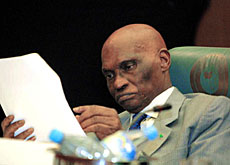Poor countries push for more technology funding

The vast majority of developing nations are backing the creation of a solidarity fund to finance the integration of information and communication technologies (ICTs).
But so far the proposal, which was launched by Senegal at the start of 2003, has met with sharp resistance from industrialised countries.
“United Nations summits have a reputation for creating a lot of frustration,” said Marie Thorndahl, an economist at the Geneva-based Graduate Institute of Development Studies (IUED).
“States rarely couple their declarations of intent with adequate financing… and this tends to create a lot of tension between North and South,” she added.
Thorndahl also points out that most industrialised nations have seen government spending slashed in recent years, making it harder to make good on summit promises.
This in turn has had a negative knock-on effect on development aid, which shrunk from 0.34 per cent of the average gross domestic product (GDP) to 0.24 per cent during the 1990s.
Digital dependence
So it would seem that developing nations have legitimate cause for concern as to where the funding for ICT projects is going to come from.
But they’re not just worried about financial considerations.
“In Africa, the transfer of technology has turned out to be a failure,” said Pap Diouf, a specialist in North-South relations at the IUED.
“The industrialisation of African countries has above all benefited companies in the North,” he added. “Sub-Saharan Africa is generally forced to take a back seat as the passive consumer of technologies produced elsewhere.”
Earlier this year, these issues prompted the Senegalese president, Abdoulaye Wade, to propose the creation of a digital solidarity fund, which would be financed by voluntary contributions from the ICT sector.
“A person purchasing a mobile telephone in Europe, for example, could choose to donate one dollar to the fund,” explained Ousmanne Bamba of Mali’s Informatics Mission. “And this could add up to quite a lot.”
Inflexible
But industrialised nations, including the United States, the European Union and Switzerland are opposed to the idea, preferring instead to redirect existing development money towards technology-related projects.
Developing countries, on the other hand, insist that this model won’t work and that current development strategies are too bureaucratic and inflexible.
“Industrialised states have proposed creating oversight commissions that would monitor the distribution of existing funds,” explained Mamadou Diop, Senegal’s Communications Minister.
“But there is a risk that ICTs will be ignored by these commissions because many African decision makers have yet to recognise the opportunities offered by these technologies,” he added.
“They say that people can’t eat computers, without recognising that ICTs can improve their agricultural and health systems.”
The head of the World Bank’s Information for Development Programme, Bruno Lanvin, is no stranger to these arguments, but he agrees that existing mechanisms are the way to go.
“If participants at the World Summit on the Information Society stick with the idea that nothing’s going to happen without additional resources, then we’re heading for failure,” he said.
swissinfo, Frédéric Burnand in Geneva (translation: Anna Nelson)
The majority of developing nations, especially in Africa, hope that the World Summit on the Information Society will result in the creation of a digital solidarity fund.
The idea, which was proposed by Senegal, aims to come up with new sources of financing for the integration of information and communication technologies (ICTs) in poor nations.
But industrialised countries argue that existing development funds should be redirected towards technology-related projects.
The issue is expected to be one of the main sticking points on the summit agenda.

In compliance with the JTI standards
More: SWI swissinfo.ch certified by the Journalism Trust Initiative

You can find an overview of ongoing debates with our journalists here . Please join us!
If you want to start a conversation about a topic raised in this article or want to report factual errors, email us at english@swissinfo.ch.